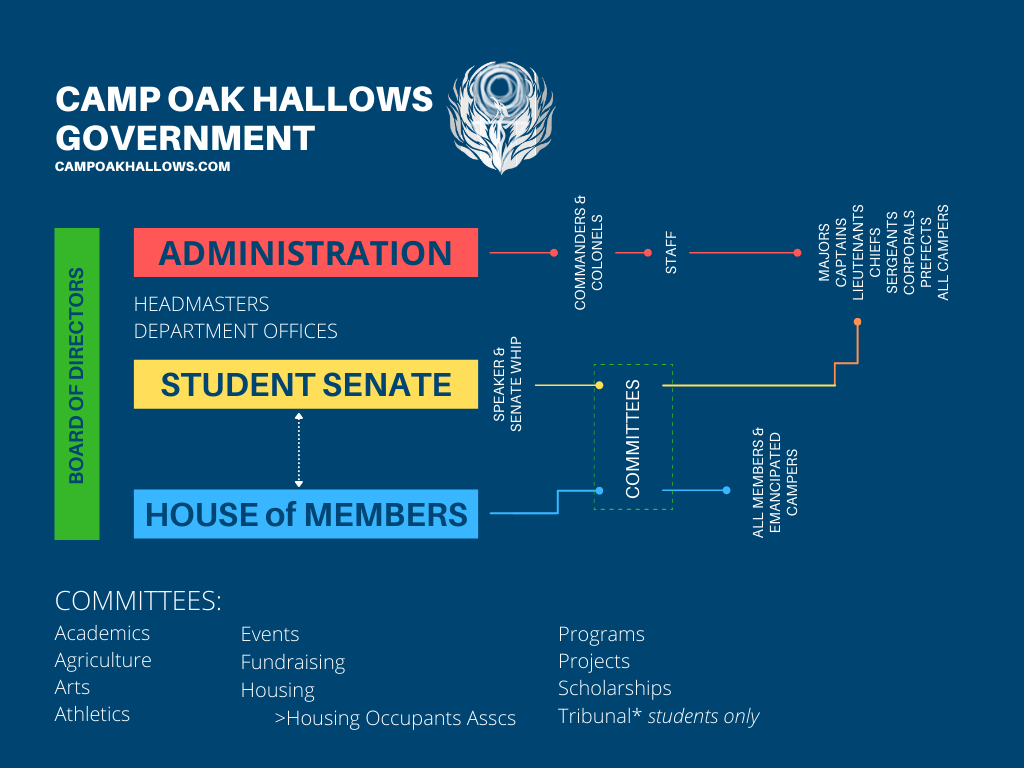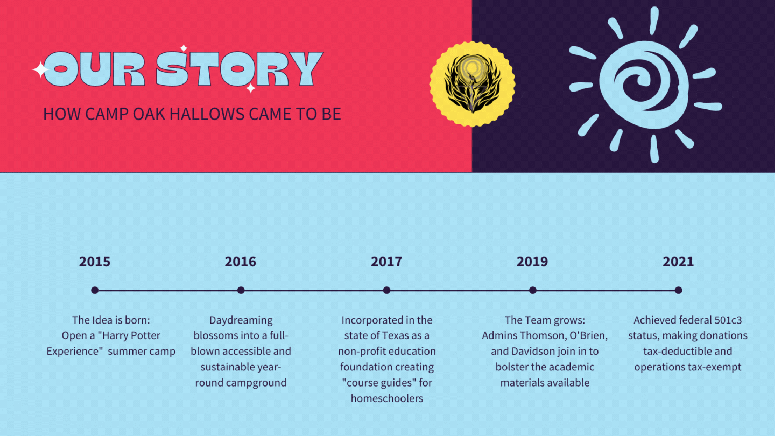
Departments
100: Athletics, Barns, Crews (“ABCs”)
200: Arts and Career Exploration (“ACEs”)
500: History and Humanities
600: Languages, Literature, and Composition
700: Mathematics
800: Sciences

Philosophies and Practices
The history of live-in programs, globally, is fraught with abuse and systemic failings that give “boarding schools” and similar youth settings a much-deserved bad reputation. Especially in light of the recent breaking news of the bodies of 215 North American Indigenous children being found near a former Canadian Catholic residential school, and the less-recent #BreakingCodeSilence movement, it almost seems silly to try to open a brand-new place like Camp Oak Hallows. But we’re doing it anyway, with a foundation designed specifically to prevent those tragedies and cracks in the system from existing.
From the very start, COH has been about accessibility and sustainability. This mission is sometimes stated as “FOOD, HOUSING, HEALTHCARE,” the Big Three things that, when unstable, most impact a child’s ability to pursue an education, and retain their learning. This is what sets Camp apart from other General Residential Operations: the “motivating issue” that led to our founding wasn’t a moral issue (religion or lackthereof), or the notion that there is some magical formula for teaching that leads to higher success (Waldorf/Steiner), or the intention of creating an elite community of students and alumni; we set out to break down the barriers that are most associated with “boarding schools” and prove that unstructured exploration is just as vital as the structured.
Everyone who is a part of Camp is ‘unionized.’ Staff, students, sponsors, even the guardians off-Camp have real built-in power to enact change in the culture and community of Camp Oak Hallows. Through a system not unlike the United States’ democratic republic, a bicameral “Congress” of the Student Senate and House of Members balances power with the Administration, consisting of both permanent and seasonal staff. Above these three bodies is the Board of Directors, who act similarly to a Supreme Court, hearing petitions and reports from “below” and taking on the tasks that COH’s underage leadership can’t all by themselves. Ideally, a tradition will be established that the Board chairpersons will be Camp alumni, rather than simply strangers taking an interest in Camp’s affairs.


Who are we?
Founded in 2016 by a few friends with the passion to give the world what they needed but never had, Camp Oak Hallows is an innovative collaboration of Virginia L Gaffney (administration), Tylar O Davidson (humanities), and Sheillagh O’Brien (food and kitchens). The team is always looking to grow, and everyone is welcome.
Join us on Discord today, for free clubs, and news: discord.gg/5wbbS5g
Get pinged when we publish something new! Subscribe:
Incorporated in Texas: 2020
IRS 501c3 Status: 2021
Contributions deductible: YES
Public Charity Status: 170(b)(1)(A)(vi)


RANK AND MERIT SYSTEM
First Term
Second Term
Third Term
Fourth Term
Prefects
Fifth Term
Corporals
Sixth Term
Sergeants
Seventh Term
Chiefs
Eighth Term
Lieutenants
Ninth Term
Captains
Tenth Term
Majors
Graduates
Alumni
Colonels
Commanders
Learn more

2015 – The Idea is Born: open a “Harry Potter Experience” summer camp
2016 – Daydreaming blossoms into a full blown accessible and sustainable year-round campground
2017 – Incorporated in the state of Texas as a non-profit education foundation creating “course guides” for homeschoolers
2019 – The Team grows: Admins Thomson, O’Brien, and Davidson join in to bolster academic materials available
2021 – Achieved federal 501c3 status, making donations and operations tax-exempt.

Camp’s “guiding literature” is a living document called, simply, The Handbook. It contains all of the necessary text of the legislation that governs what the state of Texas calls GROs, as well as excerpts from several other sources relating to the responsible and positive management of live-in communities like COH. The Handbook is generally subject to change by the Administration, Senate, and House in cooperation, and binds the Board to the will of the residents of Camp, to only act on their behalf in their stated interest. Giving students a meaningful say in their living and learning environment is an essential part of the beliefs of Camp Oak Hallows: that youth can and should be trusted to express their needs and wants, and have legitimate ways of attaining those things. The only aspects of The Handbook that are “unimpeachable” are the sections pulled directly from legal sources meant to inform the residents on why certain things “are the way they are,” and advise on how perceived problems with Camp’s operation can be resolved without needing to march on the Texas Capitol with demands.
This autonomy is guaranteed also in how COH goes about creating educational plans for and with students. By taking the framework establishing in IDEA/Section 504, known as an IEP (Individualized Education Plan), Camp Oak Hallows helps students build customized pathways to their ideal of success. Achievement is not something that can be standardized, and not all students are working toward the same end goal. While some are looking to land themselves in rigorous ‘higher’ academic settings and therefore seek specific supports to bolster applications, others see their K12 education as needing more ‘practical’ or life-applicable teaching moments to set them up for adulthood and societal independence. Balancing “book smarts” and “street smarts” isn’t something that a lot of schools and school systems prioritize. (But we do.)
Camp Oak Hallows goes out of its way to be recognized as an organization that sees “standards” and “requirements” as launch-pads, rather than minimums to be met. In the state of Texas, homeschoolers are expected only to pursue “Reading, Spelling, Grammar, Mathematics, and Good Citizenship” in a “bona fide manner.” As a live-in facility, students of Camp Oak Hallows can opt to classify themselves as homeschoolers and have their “credits” compiled on a homeschool transcript, which is accepted as valid at all Texas higher education institutions as long as the five forementioned subjects are shown as completed. There are little to no expectations made of students in private/non-public schools, though it is generally understood that these institutions (such as Camp Oak Hallows) should strive to provide education similar to and as-good-as-if-not-better-than public schools, allowing for the freedom of transfer between schools. Oh, and we have to observe Texas Week. But the key ingredient in COH’s grand scheme is the liberation from traditional attendance mandates. By removing the speedbump that is equating chair time to academic proficiency, Camp Oak Hallows can embrace the diversity of learning styles that exist in students and give merit to academic efforts regardless of how many “hours” were given to them.

GRADUATION AND DIPLOMAS
Texas Public Schools
Students must demonstrate proficiency in:
- English I or English I for Speakers of Other Languages
- English II or English II for Speakers of Other Languages
- English III, AP Language and Composition, or a comparable International Baccalaureate (IB) English language arts course
- A fourth English credit such as English IV, AP Literature and Composition, Debate, Journalism, Creative Writing, Literary Genres, or Technical Writing
- Algebra I
- Geometry
- One (1) full credit or two (2) half credits of Math such as Personal Finance, Model Applications, Advanced Quantitative Reasoning, Statistics, Robotics and Programming, OR two (2) full IB Mathematics credits
- Biology
- One (1) full Lab credit, such as Integrated Physics and Chemistry, Principles of Technology, Physics, or Chemistry
- One (1) full credit or two (2) half credits of Science such as Chemistry, Physics, Astronomy, Anatomy and Physiology, Aquatic Science, Forensic Science, or a comparable AP or IB course credit
- US History Since 1877
- US Government (One half-credit)
- Economics with emphasis on the Free Enterprise System and its Benefits (One half-credit)
- One (1) additional credit of World History, World Geography, or a comparable AP or IB course credit
- One (1) Physical Education credit of a P.E. course, Athletics, JROTC, Drill Team, Marching Band, or Cheerleading.
- One (1) Fine Arts credit of Art, Choir, Band or Orchestra, Dance, Music Studies, Theater, Digital Animation, Modeling Animation, Floral Design
- Five (5) additional Elective credits of any courses
- Two (2) Language Other Than English (LOTE) credits at different levels in the same language, OR two (2) AP or IB LOTE credits at different levels in the same language, OR two (2) credits in computer programming languages OR two (2) credits in comparable AP computer programming courses OR two (2) IB course completions computer programming courses
Camp Oak Hallows
Students are encouraged to complete programs of:
- 1000-level Literature and Language Arts, such as ELA: Introduction to Compositions
- 2000-level Literature and Language Arts, such as ELA: Constructing Compositions or Creative Writing I
- 3000-level Literature and Language Arts, such as ELA: Mastering Compositions or Journalistic Writing II
- 4000-level Literature and Language Arts, such as ELA: Introduction to Advanced Literature or Research Writing III
- 1000-level Math, such as Pre-Secondary Algebra
- 2000-level Math, such as Geometry
- 3000-level Math, such as Trigonometry or Calculus A
- 1000-level Science, such as Using the Scientific Method for Explorations
- 2000-level Science, such as Pre-Biology with an Emphasis on Health and Sexual Education
- 3000-level Science, such as Astronomy
- 4000-level Science, such as Introduction to Physics and Chemistry or Introduction to Computer Science
- Civics 1525
- 1000-level Historic Humanity, such as Pre-Secondary World Cultures
- 2000-level Historic Humanity, such as Human Geography
- 3000-level Historic Humanity, such as Independent Study of International Politics
- 1000-level ABC (Athletics, Barns, and Crews) such as First Season Physical Fitness
- 1000-level ACE (Arts and Career Exploration) such as Basic Arts
- One credit of 300/ARA (Advancement Readiness Assessment) such as a Texas Success Initiative “TSI” exam
COH Academies will have specific requirements to earn a secondary graduation diploma denoting the completion of an “above and beyond” program, similar to the Texas “Pathways” that go beyond the Foundation Plan (left.)
Campers holding certain Merits will be expected to maintain a certain success/drop ratio of Courses.
Course “failures” do not become “permanent record.” COH is not in the habit of cataloguing mistakes, or enforcing “credit recovery.”

